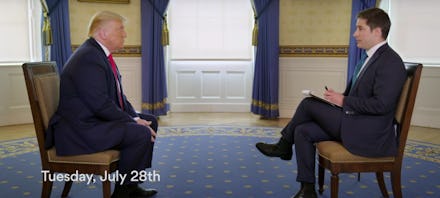It's not uncommon for President Trump to denigrate the sacrifices Americans make for this country, but his comments to Axios reporter Jonathan Swan in an interview that aired Monday evening struck a different ckord. The 38-minute interview, which touched on everything from the coronavirus crisis to Russia's arming of the Taliban, ended with a question from Swan about the late Georgia Rep. John Lewis (D).
Swan asked what should've been a rather simple question, given Lewis's legacy as a civil rights icon: "How do you think history will remember John Lewis?" Yet Trump's response was particularly Trumpian. "I don't know John Lewis," the president claimed, adding, "He chose not to come to my inauguration."
Lewis passed away on July 17 after a long battle with pancreatic cancer, an illness he made public last December. Lewis had built a reputation as as the "conscience of Congress," and he decided not to attend Trump's inauguration in protest because he didn't see Trump as a "legitimate president." It seems the president is still harboring some resentment over the slight.
The late Lewis was and continues to be known for his activism in the civil rights movement of the 1960s and, in particular, his championing of getting into "good trouble." Lewis was the youngest person to speak at the March on Washington and was beaten by national guardsmen on Bloody Sunday in 1965.
His pettiness toward Lewis wasn't the only notable statement Trump offered in the interview with Swan. He additionally demonstrated little sympathy for the struggles of those living and working in the U.S. while elected officials continue to mismanage the coronavirus pandemic. Early in the interview, Swan mentions to Trump that 1,000 Americans are still dying per day due to coronavirus, and asks about whether Trump feels any responsibility for the sway he has among older Americans (who are most at risk) given he has discouraged common public health measures, like mask-wearing. The president insists that his administration has the pandemic "under control," and when Swan presses him on the death toll, Trump responds: "It is what it is."
Nearly 156,000 people have died due to coronavirus so far in the U.S., the highest toll for a country by far. Experts say that this is likely an undercount and that the death toll will continue to grow.
It's clear that Trump sees little trouble with letting people die, and his reluctance to admit that there's a problem may stem from the fact that he actually doesn't see widespread despair and suffering as an issue. After all, he'd rather put up a fight against mail-in voting than uphold democratic values, perpetuate racist myths about Chinese people that actively put them in danger rather than take responsibility as president, and lie about the efficacy and safety of drugs unproven to treat coronavirus infections instead of advocating basic public health guidelines.
